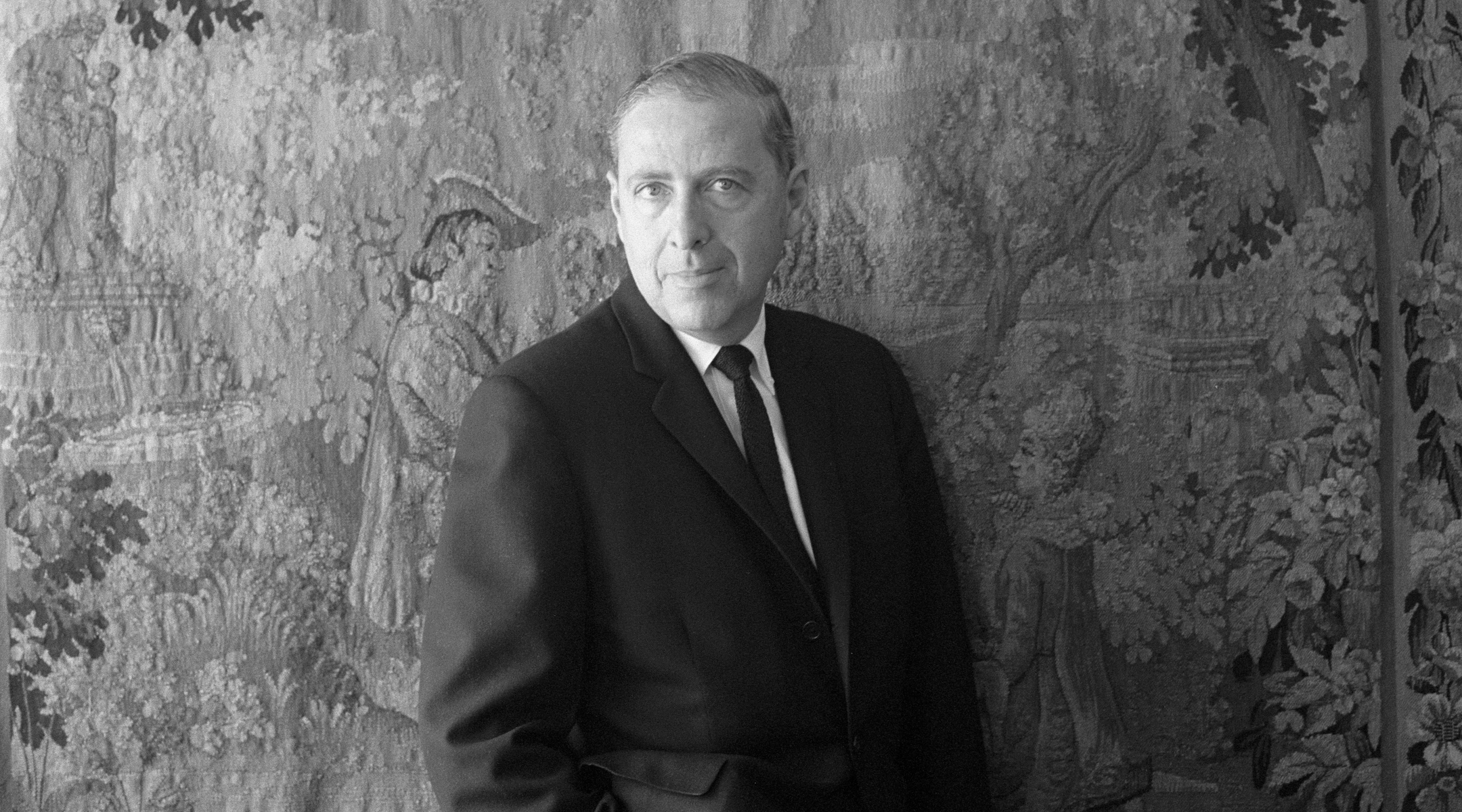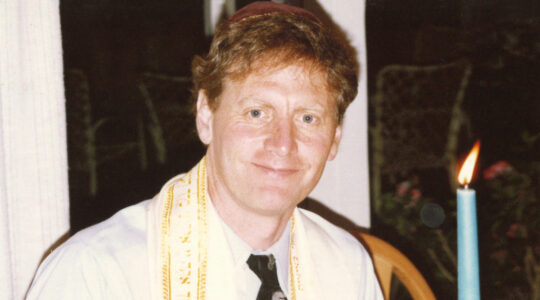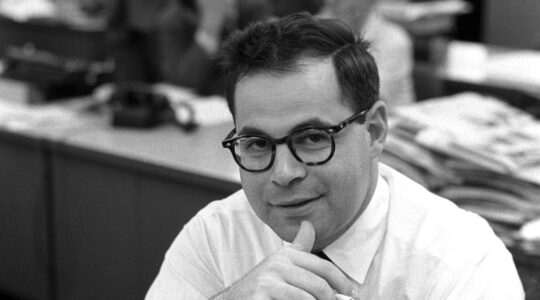BOSTON (JTA) — Herman Wouk, the bestselling Orthodox Jewish author whose literary career spanned nearly seven decades and who helped usher Judaism into the American mainstream, died Friday at the age of 103.
His agent confirmed the news to The Associated Press.
Wouk was the author of two dozen novels and works of nonfiction, including the Pulitzer Prize-winning “The Caine Mutiny” from 1951, which was a fixture on best-seller lists for two years, and the best-selling “Marjorie Morningstar” from 1955. Both books were later adapted for the screen.
His novels “The Winds of War” and “War and Remembrance” both became successful television miniseries. By the mid-1950s, Wouk’s popular and financial success as an American Jewish novelist was unmatched.
Even more unusual for a writer of Wouk’s celebrity was his Orthodox observance and treatment of Jewish religious practice in his writing. Wouk embodied the new postwar possibilities for American Jews and his writing was both cause and effect of the normalization of Judaism within the larger American Judeo-Christian tradition.
When he appeared on the cover of Time in 1955, the magazine described Wouk’s blend of worldly success and Jewish religious observance as paradoxical.
“He is a devout Orthodox Jew who had achieved worldly success in worldly-wise Manhattan while adhering to dietary prohibitions and traditional rituals which many of his fellow Jews find embarrassing,” the article said.
At the time, Wouk’s fame seemed like an incredible feat for an Orthodox Jew. Unlike other Jewish novelists, who had focused on Jewish immigrant culture and tended to portray religious Judaism as foreign and exotic, Wouk made Jewish religious observance appear mainstream in his books. Scenes of a Passover seder and a bar mitzvah service became scenes of middle-class American life in “Marjorie Morningstar.”
None of this escaped criticism. With the exception of “The Caine Mutiny,” reviews of Wouk’s works were typically mixed. Both Jewish and mainstream reviewers expressed dissatisfaction with the quality of his writing, his conservative outlook on politics and sex, and his treatment of Judaism. Some rabbis even criticized Wouk for mocking Jewish observance — though in the coming decade, Philip Roth’s fiction would radically change their perspective on what counted as literary denigration of Judaism.
Meanwhile, fellow Jewish novelists like Roth, Saul Bellow and Norman Mailer viewed Wouk as conforming to middle-class American values that prioritized marriage, family, religion and service to country. Not only did he stay married to the same woman for more than six decades, but Wouk expressed pride in his military service, for which he received a U.S. Navy Lone Sailor Award. Wouk in turn saw the others as bowing to fashionable literary trends of rebellion and shocking readers.
From his debut novel, “Aurora Dawn,” in 1947, to his last book, “Sailor and Fiddler: Reflections of a 100-Year-Old Author” — published in 2015 when he had reached a century — Wouk wove themes central to the American Jewish experience throughout his work. Even “The Caine Mutiny,” a less Jewish novel than later works, included Lt. Barney Greenwald, who gives a moving speech in defense of a lieutenant who helped keep Greenwald’s Jewish mother from being “melted down into a bar of soap” by the Nazis.
Set in the 1930s and ’40s, Wouk’s fourth book, “Marjorie Morningstar,” heralded a new era for American Jews. The novel followed the journey of a New York Jewish protagonist no different from any other bright and beautiful young woman of the era, an image further cemented by Natalie Wood’s portrayal of Marjorie in the 1958 film version.
Not since the 1927 film “The Jazz Singer,” starring Al Jolson, had a movie shown Jewish religious scenes. But unlike “The Jazz Singer,” Marjorie and her religion were not exoticized — Jewishness was portrayed as middle class and American. With Marjorie, Wouk had succeeded in making a story about Jews into an American story.
Marjorie also marked a turning point in his writing career. With confidence that he had readers who would follow him to less popular subjects, Wouk’s fourth book, his first work of nonfiction, took on the subject of Orthodox Judaism. Published in 1959, “This Is My God” was a primer about the Jewish religion intended for both Jewish and non-Jewish readers.
As other American celebrities would do, Wouk used his fame to draw attention to his little-understood religion. Serialized in the Los Angeles Times, “This Is My God” introduced readers to such Jewish particulars as the laws of kashrut and family purity and the holidays of Sukkot and Shavuot. The book showed, through anecdotes from Wouk’s glamorous Manhattan life, that it was possible to be both a modern American and Orthodox.
At a time when Jews still encountered quotas at universities and discrimination in hiring and housing, Wouk’s example provided inspiration. “This Is My God” became a popular bar mitzvah and confirmation gift for young Jews of all movements.
Born in the Bronx borough of New York City on May 27, 1915, Wouk was the second of three children of Esther and Abraham Wouk, both immigrants from Belarus. Abraham Wouk began work as a laundry laborer and found financial success in the laundry business. Herman spent his early years in the Bronx receiving basic Hebrew training from his grandfather. His childhood included the teasing and bullying that was common for bookish boys in rough neighborhoods.
From an early age, Wouk found a haven in reading, family and Judaism. After graduating from the public Townsend Harris High School, Wouk entered Columbia University, where he served as editor of its humor magazine. He also took courses at Yeshiva University.
Upon graduating, Wouk briefly abandoned his religious lifestyle when he became a radio dramatist, writing for the comedian Fred Allen. Although the work was lucrative, Wouk felt a void in a life without Jewish learning and religion, and he eventually returned to his previous level of observance.
In the coming years he would reside in the Virgin Islands, New York’s Fire Island, Washington, D.C., Manhattan and Palm Springs, California — and in all those locales he was involved in setting up Jewish study and prayer groups.
Following Pearl Harbor, Wouk joined the Navy and served in the Pacific, where he was an officer aboard two destroyers, participated in eight invasions and won several battle stars. Wouk also started to write “Aurora Dawn” while aboard ship. After Wouk sent part of a draft to one of his former Columbia professors, the professor connected Wouk with an editor, and a contract followed.
While his ship was being repaired in California, Wouk met Betty Sarah Brown, a graduate of the University of Southern California and a civilian Navy employee. After her conversion to Judaism, the couple married in 1945 and had three sons. Betty, who died in 2011, would eventually become her husband’s literary agent.
Wouk is survived by two sons, Nathaniel and Joseph, and three grandchildren. His oldest son, Abraham, died in a 1951 swimming pool accident.
(Rachel Gordan is an assistant professor of religion and Jewish Studies at the University of Florida, where she is the Shorstein fellow in American Jewish culture.)
JTA has documented Jewish history in real-time for over a century. Keep our journalism strong by joining us in supporting independent, award-winning reporting.






